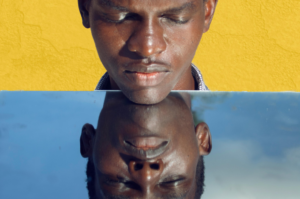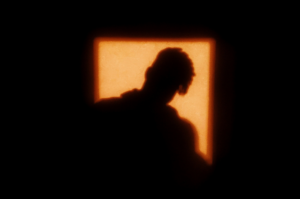
“P-A-L-I-N-D-R-O-M-E.”
You wait and watch as his lips move. He stops enunciating, and pouts a kiss on your forehead. His lips feel like the caress of rose petals. “Chinuwa,” he says, “that’s today. 02-02-2020. The rarest day of our generation. It will never reoccur in that perfect sequence; we’d have fewer zeros onward. Isn’t it significant that our first afternoon lawfully together is a palindrome?”
You are quiet. A thousand days are tumbling over in your mind, like kids on a summer field, they spin and backflip within you.
Where did you start from?
**************
In a pool. Tunde’s birthday pool party in Las Vegas, with all his white friends. They were LA boys who wore headsets to class, with an attitude as big as a classy rich Nigerian Top, and just as much insecurity. You were a little hydrophobic and sitting at the edge of the pool, playing with your feet in the water, when a handsome, slim, white boy popped out of the blue water, crashing through all barriers, and pulled you in.
You choked on water and rage and sputtered unintelligibly. He said you should calm down, that you had purr-fect skin, and you hollered at him to shut up. What was the connection between this silly stunt he just pulled and your perfect skin? They all chuckled, and he held you and kissed you, just behind your ear, lips so soft and sensual you hated your puberty dick for nodding. You could have slapped him for such guts, but he had swum away and was winking at you from a safe distance.
You pulled out of the water like a wounded badger. You couldn’t believe that sky above you was still azure.
**************
You two are in a pool, again.
Time and tide don’t change the color of pool water. You had visited Nigeria one summer with your lawyer friend, Tolani, who had associate training at Wellesley, to settle a land dispute between your extended family and the clan from the other town. You had spent longer than scheduled at home, visiting old friends, revisiting childhood spots, introducing Tolani to your adolescence, showing her your father’s moldy newspapers—stories of politics and economics that he had been more interested in than in your early confusions; taking boat rides at the Otuocha Beach and eating isi ewu at the hotel bar in Ifite, and then accompanying Tolani to her grandmother’s village in Ogun state. Tolani led you through the gentle affinities of her culture, both of you whispering in the hut she grew up in, laughing and slapping palms against each other’s, because her grandmother had rapturously assumed you were Tolani’s long-awaited fiancé and called you, “oko wa”. The laughter stilled on your tongues, a coating of fire, with you later eating alligator peppers and fanning your open mouth and crying and laughing because her grandmother insisted it dried up growing cancer tumors. The first night found you two wondering aloud why the heat seemed to have compassionlessly doubled, the mosquitoes’ bite more vicious. Tolani laughed at the situation: Americanahs marveling at the ultimate Nigerian welcome. You fled back to Awka and steeped yourself in the procacities of your relatives, feeling a trembling looseness in spirit, as though you should return to America. But you were unsure what would happen to your new certainties, how much more uprooting it would require from you again.
A film had just come out—October 1—and you went out with friends to the cinema to see it. You thought the film accurately hyped and revealing, if a little maudlin, and your friends thought so too. So, it stunned you to hear the tirade of a man striding out of the theater, shouting at everyone who cared to listen that the movie was “bloody misrepresentative,” “bloody insubstantial,” bloody this, bloody that. It was altogether too much blood. He was tall and had shoulders spreading out like Dwayne Johnson’s. You couldn’t keep your eyes off him. It was the first time you would hear someone use the word “insubstantial” so smoothly, so glidingly. He found your eyes and walked over to shake hands, said his name was Ikenna and that he was a cinephile. You were grateful—because you had no idea what a “cinephile” was—that he went on to say it meant he really did enjoy movies. You said “oh” and he said that the Reverend Father did not do what he did because he was gay and that the maker of the movie shouldn’t have linked two different situations together and misinformed the audience. He called it maleficent propaganda. You didn’t know what to call it. You were gazing at his Will Smith lips.
He asked for your number and said he would see you around. You started visiting him in his self-contained apartment near the campus. You bought an air freshener and placed it on his plastic table, near the window. You dusted out his foam and spread it in the sun. You fixed the light bulb in his room (he said he was electrophobic; he wouldn’t be caught plugging the standing fan without first switching off the wall socket). You texted Tolani to send you the recipe and procedure for jollof rice. Tolani laughed and called you “a desperate woman” and said you should cook oyinbo rice for him. You told her you didn’t want to run his tummy and that you definitely didn’t intend on poisoning him. She sent a text to guide you and you cooked jollof rice, and felt a childish twinge of delight when he took hurried spoonfuls and smacked his lips, his tongue flicking in and out. You had feared the pepper would be too much since it was Tolani’s prescription. You forgave his large spoonfuls and loud chewing and teeth scraping. You let him ram into you at night until tears came into your eyes. It must be the jollof rice, you said to yourself. The condom was shoddily set and it clawed through your soft delicate walls. He did not brush his tongue. The skin of your lips felt peeled and peppered, and there was a constant grinding pain in your shoulder-blades. But you smiled when he was done and rubbed his head. Perhaps it was the anxiety that happened to men on their first time with someone they had liked and longed for, for a long time.
But it was not any anxiety. The first time he hit you, it was because you suggested longer, gentler foreplay. He slapped you in front of his book-crowded table, a swift slap, but heavy enough to send you crashing into the books. He pulled you up and struck every available part of your body. You muffled your grunts because the neighbors must not hear you. He was so strong he crushed your very fingers. You didn’t know a man could weaken another man like that. Still, you forgave him. You were back in your mother’s house when his text messages flooded your phone: he was sorry, he was a bloody fool, an insensitive idiot, he shouldn’t have treated you that way, please come back and let him make it up to you. So, you went back, and this time, it was because you complained that he smelled awful. He broke his jug across your forehead. Exeunt. Apology. Resolution. Enter. Repeat. Weeks of this later, you found your passport and went back to America. You told nobody about it. Not even Tolani; she might have recommended poison. Plus it seemed flippant a cause, why you got beaten. Who beat anyone for complaining about foul odor? People got bashed up instead for cheating, or for going through their partner’s phone. So you gave a vague, more respectable reason for leaving.
You got to America to find Jason looking for you. He was just as arrogant and annoying as before. Only that you were no longer hormone-crazed teenagers. Things between you were calmer and cooler, more fluid. Like today. You are firm, sturdy adults with suits on your back and success in your grasps. Success means wedding bands around your fingers. You think of your mother and aunts at home when next they call to say, “are you bringing home an akata? Why are you staying so long with this your oyinbo friend, gbo? The agboghos here have ripened, even Obinze’s daughter born yesterday has started growing breasts! Come back home oooo, and get a good girl from a family we know well. All your mates ‘have’ married.”
When you pick their call and respond with a solacing tone, will they hear the fulfilment in your voice? Will they hear and know, just know, that you will never come back home, even if you do come back home?
Palindrome. Who said things cannot collide, fuse together, become miracles and emerge as a rarity?
“Odikwa na ma?”
He’s lowering his head for yet another kiss. How many that afternoon alone? Eighteen? Twenty-five?
“Yes, all is well,” you say in response. The water soaks deeper into your suit, gumming your shirt to your body, and you worry that both of you would catch a cold. He had insisted, begged you actually, in his gentle and feathery Igbo, that you swim fully clothed in the pool, because he wants to remember this day, this palindromic Sunday, with both of you in a pool. You thought it an exceptionally inane act, but you entered the pool before him, feeling loath and limp, until his solid presence behind you steadied your fears and, in his embrace, you found an eternal assurance.
You thought of the night you started teaching him simple Igbo expressions, two nights after you finally let him into your home in Baltimore, fifteen nights before he proposed to you during an evangelistic rally in his church, a rally he had invited you to attend with him. The whistles and applause from the worshippers around had frozen your lips at first and you had forgotten what you wanted to say, what you should say in response to a man publicly proposing to you in a church. Back at home—“home” is really a faraway, detached concept now, like the first world before Noah built an ark—they would fling stones and damnations, or get petrol. But then—there he was, kneeling on the terrace, holding up a diamond ring, his church fliers tucked in his armpit, the sun a lurid slant across his cheek, his eyes crinkly with apprehension and excitement. you had stuttered before letting him slip the ring on you.
And you had laughed, a throaty, rhythmic sound, because of course, he was being ridiculous. Then you had cried that night as he slid into you for the first time. He stopped, pulled away, and asked you if he had hurt you. He was sorry; he had thought it was what you wanted and that your body was ready. You’d buried your face in the downy pillow. How could you tell him that your ex-boyfriend had slapped you louder and harder than he had caressed you, that you were more used to smacking than to smashing, that love for you was a helpless rendering of beatings when you made your loved one angry enough to hit you? How could you ever look Jason in the eye and tell him you had never known this type of lovemaking before, that you did not know that a man’s touch could make your toes curl, that touch for you had always been metallic pugilism?
You are quiet now. The water whispers songs of tomorrow. You gaze up into his blue eyes, a gaze that sears its way into the soul, that wants to arrive at the future. Your fears are lucid. You thought you had conquered each fear: leaving Ikenna, leaving Nigeria finally, uprooting your mind to chase after your life and catch up with it, shaking the sullying soil off your roots.
You are with him, the touchstone of your dreams, a breathing reality, the home you’ve always sought, a place without bruises.
Where your scars can heal.
You feel the same renewal in your core, even underneath your toes, each time he appears with flowers at your classroom door at the school where you teach History and Foreign Studies to wide-eyed, slouch-backed Korean and Irish and white American and African-American teenagers. Teenagers who used to laugh at you and him, then used to giggle and whisper, then used to say “Aw”, teenagers who are now used to him appearing behind a thicket of flowers.
You are here, finally, a receiver of flowers. It is what you’ve always wanted to be. It should be what you’ve always wanted to be—right?
The first time (and, you hope, also the last) you had a panic attack and yelled at him, he had stepped back in shock, his pale-green eyes dilating. Spiders had rushed up your throat, an ugly rage tearing you up from inside because now you had yelled at him, and the last thing you wanted to do in your life was to yell at him. He had redeemed you, given you a new life, given you the chance not just to be loved but also to love and really love, and you had yelled at him. You were in his flat in Willow, wearing his extra-large striped shirt only and standing in his kitchen, cooking dinner, light, tappy on your feet, humming random songs, when he hugged you from behind, brushed his lips down the line of your neck and talked about some nasty kitchen sex. Your heart leaped and your eyes changed and you yelled. after he recoiled from you and you burned brightly and then cooled down to a blue simmering, you fell to your knees and said you were sorry. He looked newly scandalized, as though what was happening, you kneeling, was even more rattling than what had happened, you yelling. He hurried forward and took you by the arms and held you up back to your feet. He gazed at you, his fingers still on your arms, his eyes still the color of mildew but now twinkling with a sheen you would later come to attribute to him as “grace”. Your lips quivered, his face blurred before your eyes. It was different, so jarringly different, from you shouting at him as a teenager at Tunde’s party. He pulled you to his chest and enfolded you, mumbling “I’m sorry, baby. I didn’t know you wouldn’t like it”, repeating it and rubbing your back, and all you wanted to do was sit on that kitchen floor and weep your eyes out. You should deserve him, he should deserve you, yet you knew another would be better suited for him.
“Yes, Jason, all is well,” you repeat, pushing back your fears, because they exist only when you want them to, and kiss him back, deeply.
Photo by Serrah Galos on Unsplash










Evaleni December 24, 2022 01:33
This story is refreshingly beautiful.